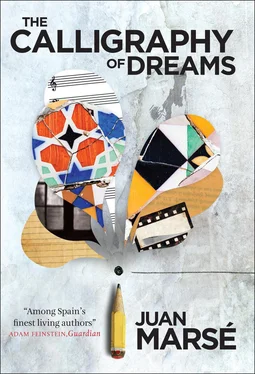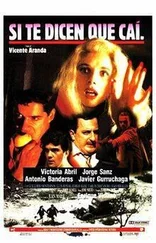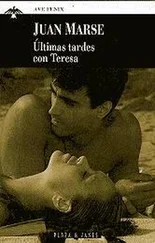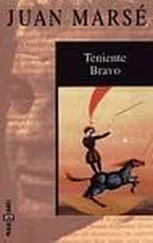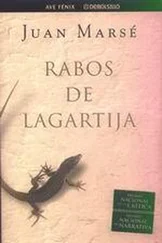It doesn’t matter, I’ll make sure Bill’s plane takes off again. That’s what the boy thinks and is about to tell his father, to say it loud and clear so that he is heard by all those who have been laughing at him in a kindly way, those who have come here tonight ready to burn everything just in case, because of the flies. But no-one hears him say anything, and it is quite likely he never managed to utter a word. Possibly he did no more than think it, without taking his eyes off the flames. He will spend his life thinking things like this, without ever saying them. For example, that he can see the plane escaping the flames yet again, climbing into the starry night, leaving far below the writhing black smoke and that strange ceremony of fire, destruction and death. From the cockpit enveloped in flames, the hero smiles at him and waves a greeting.
*
Ringo remembers now another argument with his father that took place some time after Bill Barnes had saved himself by flying out above the big bonfire. The Rat-catcher had eventually learnt what had happened with the air rifle in his grandparents’ vegetable garden, but he brought up the subject as if he knew nothing.
“By the way, son, what became of that air rifle Uncle Luis gave you?”
“I don’t have it anymore.”
“You don’t? What happened?”
“I swapped it for The Mystery of the Laughing Shadow and The Red Menace .”
“And what’s that?”
“They’re novels.”
“You exchanged the airgun for a couple of cheap second-hand novels? Your Uncle Luis won’t be happy when he hears that.”
Uncle Luis isn’t his uncle or anything of the kind. He’s nothing more than a workmate of his father’s, another of the brigade’s rat-killers. A starving barfly, a poor devil, a casual council worker who prefers to spend his time knocking back plonk. He and his father have insisted Ringo call him uncle. Just to annoy him.
“That’s a shame,” his father adds. “It was a good air rifle, comrade.”
Calling him “comrade” is just to annoy him as well. He says it in a friendly way, as if it’s a joke, but that word is two-faced: the Falangists call themselves comrade too, don’t they? And what does it mean when they say it? As time goes by, Ringo is beginning to realise certain things. He hates the fact that his father enjoys upsetting people, he hates that he’s such a show-off, when in front of his mother and his colleagues from the pest control brigade he makes out he’s more of a red, more of a rebel, more libertarian than the anarchist Seisdedos himself — who by the way, Uncle Luis tells him, was killed just three days after you were born, kid, on January 11, 1933. Above all, Ringo detests his father’s self-serving, deceitful way of forgetting certain things, and his barefaced contradictions; he would boast to his friends that he had always been a diehard anarchist, and yet at the same time was proud that during the civil war his Alberta was a switchboard operator at the Socialist Party headquarters. Nowadays the anarchists don’t bite, says the big show-off, they’ve been tamed and trained like mice in a circus, like those grateful immigrants up in Campo de la Bota who kiss the priests’ hands. He comes out with things like that, the lying Rat-catcher, completely out of the blue.
“So you took a dislike to the airgun, did you?” his father goes on. “Might I know why?”
“Just because. I don’t want to see it again, and that’s that.”
“Alright, so you don’t want to see it again. And who did you give it to, who was the lucky fellow?”
“A boy I made friends with. An altar server from Las Ánimas.”
“Hmm.” His father stares at him, and he lowers his gaze. “So you didn’t want to. No way.”
“No way what?”
“… you wanted to kill any more pigeons with that gun.”
“I’ve never shot at pigeons.”
“At birds then. You think you should never have shot them, is that right?”
“Yes.”
“And that’s why you got rid of the air rifle.”
“Yes.”
“And you thought that was an end of it.”
Shit, of course I did, he shouts inwardly.
“Well, there’s something you need to know, comrade,” his father says. “The priest at Las Ánimas has been spotted firing the air rifle in the parish garden. Taking potshots at the sparrows, would you believe? Your friend the altar boy must have lent it to him, or the reverend took it from him, or bought it, who knows? No, don’t look at me like that, he wouldn’t be the first son of a bitch priest to go around firing a gun. So as you see, even if it’s not you pulling the trigger, your air rifle is still killing birds. If you think about it, you haven’t ended anything.”
Ringo suddenly feels anger rising in his throat like vomit. He would gladly have strangled the hypocritical, arrogant, busybody of a Rat-catcher there and then.
“I’m not to blame for that.”
“I didn’t say you were, Son.”
“I was fed up with the air rifle.”
“Fed up with the rifle, or of killing birds?”
“It’s the same.”
“No, it’s not.”
“It isn’t? What’s the point then?”
“Well, perhaps so you learn to be a bit more responsible. And besides, you could have given it to me.”
“To kill rats with? Because you make a living killing rats and mice, don’t you?”
“Yes, that’s my job.”
“With an air rifle?”
“Well, there are better and easier ways, but an air rifle, even if it only fires pellets is also good,” he says, ruffling the boy’s hair. “Don’t be angry, dammit. I’m only telling you all this so you think for yourself a bit, so you understand that to get what you want you have to do more than pick up or not pick up an air rifle.”
Ringo also hates having his hair ruffled. Killing rats and mice with an air rifle isn’t the same as killing birds, he thinks, it’s not something that’s going to stay with you for the rest of your life. It’s not. A disgusting blue rat is a disgusting blue rat, and a little bird seeking shelter from the rain in a fig tree is quite different. Even if it’s a predatory sparrow that’s cruelly devouring a worm. Anyway, he can’t bear being called comrade or having his hair mussed up.
“Besides, I don’t believe you,” he retorts. “The parish priest is a good man.”
“Do you mean that priest with the crew-cut who was the first one to give you music lessons, that Reverend Amadeo Oller, your mother’s friend?”
“He taught me and a lot of other kids at Las Ánimas. Reverend Amadeo would never fire an air rifle.”
“He wasn’t the one who was shooting. It was a young, good-looking priest, a conceited little rat.”
“I couldn’t care less. It’s not my air rifle anymore.”
8. ADVENTURES IN ANOTHER NEIGHBOURHOOD
In the years between thirteen and sixteen, many things happen to him, the importance of which he does not grasp at the time. Shortly after he has turned thirteen, one luminous autumn afternoon, stuffed in the grey coat he hates because it immediately labels him as an apprentice on an errand, he is standing on the corner of Calles Valencia and Bruch, in the select Ensanche district, staring in wonder at the facade of the Conservatorio Municipal de Música. No-one, and still less the music students who pass by to enter or leave the conservatoire, could imagine that at only thirteen, working more than nine hours a day, earning twelve pesetas per week, and obliged to wear his ugly, oversized coat, this youngster has on him an emerald and ruby necklace, and a gold brooch in the shape of a salamander dripping with enamel, pearls, opals and diamonds, two pieces valued at more than thirty thousand pesetas. He has to deliver them to an important jeweller’s shop near here, without loitering in the street or getting distracted by anything. To avoid the pieces being stolen on a tram or the metro, he is carrying them in a small canvas bag tied to his belt and dangling inside his underpants, very close to his cock. Every so often he feels with his fingers to make sure the bag is still there beneath his clothes, but right now he isn’t even thinking about it, because he’s listening to music he believes was always destined for him.
Читать дальше
